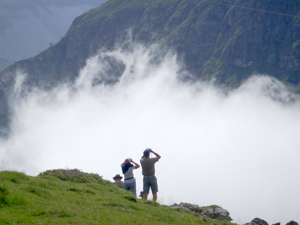Q: How do we get the conviction to go on a spiritual quest? Unlike science, there are no indicators to give feedback if this is even the right path. We need to have blind faith in the general idea itself before we venture into it. Can we only do this through negation of the other paths, where apparent validations are possible by material feedback.
A devil’s advocate argument could be to dismiss everything associated with the vedas/upanishads as nonsense, since nothing can be proved. Another way to look at this is to acknowledge that the ancient sages have come up with practices such as yoga and meditation, which sort of proves their intellect and extrapolates on their ability to see things farther than a average person can and thereby have faith in their judgements.
I am not able to articulate my question very well but I hope I got my point across.
Answers are provided by: Ramesam, Dhanya, Ted and Dennis.
A (Ramesam): Man, by his/her very nature, feels incomplete. He seeks fulfillment of what he lacks through effort using his natural or acquired talents. In fact, it is this “lack” that drives his passion for action along the path of the means chosen by him suiting to his comfort-level.
At the most basic level the drives that motivate a man for action are the biological and physiological needs. As described by the Psychologist Maslow, the subtlety of these needs changes from a lower to higher level in the following manner: Continue reading →



